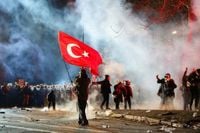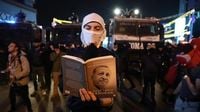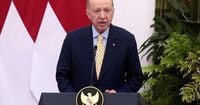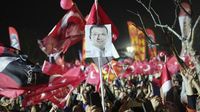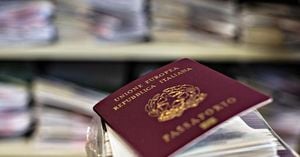Protests continue to erupt across Turkey following the recent arrest of Istanbul Mayor Ekrem Imamoglu, an influential figure in opposition politics and a potential challenger to President Recep Tayyip Erdogan. Tens of thousands of demonstrators have taken to the streets for seven consecutive evenings, calling for justice and expressing their discontent with the current government, as reported by multiple sources.
The unrest started after Imamoglu, along with 48 others, was detained amid allegations of corruption and connections to a terrorist organization. These charges come at a time when Imamoglu was poised to be the official candidate against Erdogan in the upcoming presidential elections scheduled for 2028. The protests, mounting in scale since they began, draw comparisons to the Gezi Park protests of 2013, a pivotal moment in Turkey’s recent history when citizens rallied for rights and democratic principles.
Özgür Özel, the leader of the Republican People’s Party (CHP), emphasized the significance of the rallies, urging supporters to prepare for a mass demonstration on Saturday, March 29, 2025. Despite the demonstrations being declared illegal in Turkey's three largest cities—Ankara, Istanbul, and Izmir—people have shown a remarkable willingness to defy these bans. According to Istanbul authorities, there have already been over 1,400 arrests since March 19, 2025, which included journalists and other peaceful protesters.
Imamoglu’s arrest has sparked a wave of outrage among citizens, with many viewing it as a politically motivated move to eliminate a significant rival ahead of the elections. “What is happening in Turkey is pushing the country from an authoritarian regime toward outright dictatorship,” journalist Yavuz Baydar remarked in an interview. The political climate, which was once in Erdogan's favor, is swiftly shifting, and the economic fallout from these recent events may also be significant.
The stock market has plummeted, and the Turkish lira has seen a sharp decrease in value, intensifying concerns about economic stability and citizens’ livelihoods. Just last week, the Istanbul stock exchange experienced its most significant drop since the 2008 financial crisis, leading many to call for urgent action and addressing the economic issues plaguing the country.
Earlier this week, democracy advocates, academics, and students have taken up the cause, noting the stark differences between the current protests and the earlier Gezi protests. Onur İşçi, a political science professor, highlighted the unique nature of the current mobilizations, as they are politically motivated and closely tied to the CHP, unlike the Gezi protests, which were more focused on social causes. Today, students are playing a more central role in leading demonstrations across the country, showcasing a generation that has known Erdogan as their leader for most of their lives.
One notable development during the protests was the solidarity expressed by various opposition factions. Not only were conventional opposition parties present, but leaders from the pro-Kurdish opposition also joined the fray, indicating a unified front against the Erdogan administration. Tuncer Bakirhan, co-leader of the pro-Kurdish Democratic Regions Party (DEVA), referred to Imamoglu’s arrest as a civil coup that undermines the spirit of peace within the country.
As the protests gathered momentum, many citizens were apprehensive of the consequences of standing against the regime. Indeed, after four days of intense interrogations, Imamoglu was acquitted of several charges but still faces corruption allegations linked to his tenure as the Mayor of Beylikdüzü from 2014 to 2018. This development reflected the maintaining grip of the ruling party on political power through judicial means.
At a critical juncture, citizens expressed concerns for the stability of Turkish democracy and the consequences of continued authoritarianism. Many believe that neighborhood and community solidarity is growing among demonstrators—a fact underscored by 15 million people who voted for Imamoglu during the party’s primary elections shortly before his arrest.
The significance of the protests is palpable. As Orhan, a university student, conveyed, “We have seen increasingly limited spaces for free expression and a growing number of prohibitions.” The sentiments echoed throughout the protest route, voiced by those chanting slogans demanding change and accountability.
In the backdrop of these events, Erdogan’s response has been to dismiss the protests as theatrical displays orchestrated by terrorists. “We will not deliver our homeland to the terror in the streets,” he declared, as he took measures to reinforce security force mobilizations across the country.
As the weekend approaches, there's speculation as to how Erdogan will manage the mounting tensions while sustaining his political influence. It remains to be seen whether a call for calm, coupled with a potential rethink of economic policies, will quell unrest or only further ignite the flames of dissent among the populace.
In a broader context, the current protests represent a decisive moment in Turkey, a country grappling with questions about democracy, civil rights, and the authority of state power. The question now is whether the spirit of resistance can triumph, mirroring the hopes of those who believed in a different Turkey's future.
